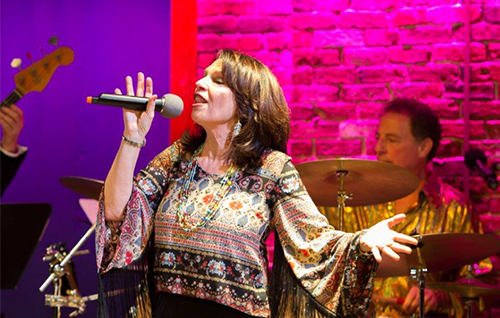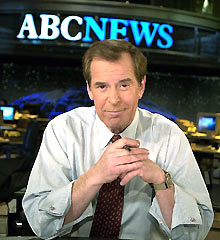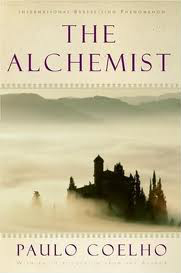The Voice
Hildy’s Story

In the Fall of 2006, I bought a pair of green sandals with a cute kitten heel. I enjoyed the color and style and made sure they were comfortable, but it never occurred to me to examine the sole. Several days later I put them on and headed down my basement stairs. One step onto the threshold and out went my feet as though I’d stepped onto ice: one foot went back and the other scraped the wall in front of me. Fortunately, the basement stairs are very narrow, and I was able to catch myself by grabbing both walls of the passageway.
Thus, began an astonishing journey. After my narrow escape, I felt fine, except for some discomfort in my left wrist, elbow and right ankle. I figured I should check myself out, primarily for the twinge in my left forearm. So, I began with a referral to see a hand surgeon who wanted to give me cortisone injections, but she wasn’t sure what site to use. Next, another hand specialist who wasn’t sure the problem had to do with my hand – maybe it was tennis elbow? My referral was to a neurologist to confirm a diagnosis, but he only tested my wrist and not my elbow. He concluded there was no nerve damage in my wrist and ordered an MRI to see if I had a pinched nerve in my back. The MRI came back. It showed no pinched nerve – but it picked up two tiny spots on my right lung. My internist sent me for further tests and an eventual biopsy. The diagnosis: lung cancer!
Fortunately, my internist sent me to a top-notch surgeon, Dr. John Wain, at Massachusetts General Hospital who scheduled my surgery for three weeks later. Because of my early diagnosis, he was able to remove just the two small tumors in two lobes and a small section of tissue around the sites. They were small, early stage, and contained – they hadn’t spread. My oncologist, Jennifer Temel felt I didn’t need any further treatment as did her colleague, Dr. Tom Lynch, Chief of Thoracic Oncology. My internist reflected on all the events that led to this fortunate outcome and said to me, “Somebody up there really likes you!” I went home from the hospital to recuperate.
Most people would say there’s nothing fortunate about getting lung cancer. In fact, it was horrifying, shocking and upsetting to wrestle with the diagnosis and try to figure out what it meant for my life and life expectancy. As I came to terms with it, I also found that the experience gave me a different level of awareness of how lucky I have been. My husband, Richard and daughter, Micaela went to all of my doctors’ visits with me. My son, David, and his wife, Amy, arranged for food to be delivered. My daughters, Claire and Robin, came from San Jose and Chicago to nurse me in the hospital and when I came home. My dearest friends rallied to help me in every way possible, from researching the latest treatments and outcomes of lung cancer to bringing me dinner and keeping me company. Their extreme kindness made me vow to be a better friend to someone in need. So many people expressed concern, good wishes and a desire to be involved and updated about my recovery. I was so moved by how connected all of our lives are, even extending to good people we’ve never met.

All of us know someone who has had lung cancer. Most of us have stereotyped lung cancer: I know I have. It seemed like a disease reserved for elderly men who smoked for a lifetime. This isn’t true. It can happen to any of us. This disease touches all of our lives. It might be a member of your family, a friend or a neighbor. Perhaps you are a survivor. Or, perhaps its someone you feel you know. Did you experience the same shock and unfairness I did when learning that Dana Reeves, a young non-smoker, died after years of heroically caring for her husband Christopher Reeves following his riding accident? Perhaps after inviting Peter Jennings into your home every evening to bring you the news, you too were surprised by his illness and death. Remember how charming and funny Suzanne Pleshette was on The Bob Newhart Show? For me, no one had a voice like Beverly Sills. All of these well-known celebrities suffered and died from lung cancer.
That’s why early detection is so important.

In the days after I came home from the hospital, I worked to get my strength back. I did laps around my bedroom for exercise. I used my recovery time to reflect on my life, on what was important and how to spend my time. I found inspiration through a book recommended to me by a tour guide, Tolga, whom I’d met while on vacation in Turkey. I emailed him about my lung cancer. He wrote back, quite unsentimentally, and said to read The Alchemist, a fable by Brazilian author Paulo Coelho. It’s a book about learning to read the omens strewn along life’s path, and, above all, following our dreams.
This wise guide said it was for me to make something of my experience. After I finished reading the book, I realized that the key point was about transforming commonplace events into something of value, making something of each and every experience. This message spurred me to think about how I could find a way to make something worthwhile and life affirming out of having had lung cancer, an experience that on the surface was of no value whatsoever.
The answer was Upstage Lung Cancer.
Creating Upstage Lung Cancer
My life has been about caring for people and bringing joy into their lives when I can. I have two professions. I am a clinical psychologist and I am a professional singer. As a psychologist, I have the honor of being invited into people’s lives and connecting at a deep level. As a singer, and a member of The Follen Angels (my jazz/cabaret group), the music is also about making meaningful connections. Our group has so much pleasure creating music together and then sharing our programs with enthusiastic audiences. Music ignites deep feelings and often, important memories. For me, music is life affirming. It’s therapeutic. Could I turn these skills and interests into something that could make a valuable contribution to raising awareness of lung cancer and its serious consequences, while supporting research on early detection and new treatments for this dreaded disease?
The birth of an idea
My reflections led to ideas about creating a musical theater event that could be used to raise money to benefit lung cancer research and raise the awareness of our cause. I began to conceive of a show to feature the great showman, Florenz Ziegfeld. I called my writing partner, John Lamb and asked him if he’d be willing to put our current project, a mystery novel, on hold to help me finish writing a musical theater show I’d begun called, Ziegfeld! He too was enthusiastically on board.
I met with nationally renowned Thoracic Oncologists Tom Lynch, MD and Jennifer Temel, MD at Massachusetts General Hospital Cancer Center in Boston, Massachusetts. We discussed the exciting and innovative research going on at the Massachusetts General Hospital Cancer Center looking at early detection and new treatments for lung cancer. I told them I wanted to use the Ziegfeld! project to raise funds to support these kinds of research.
I reached out to my friend, Crispin Weinberg, and then I contacted Susan Gessner, who had been diagnosed with lung cancer six months earlier, and at a very early stage, too. Together, we created Upstage Lung Cancer. Susan agreed to serve as President of the Board of our non-profit organization. Our friend, Melissa Langa, an attorney, volunteered to help us with the papers and we submitted the application in August, 2008. From there, we contacted a group of dear friends with exceptional abilities and talents and asked them to serve on the Board of Directors of our new organization. We held our first Board meeting in September. Each member brings particular areas of expertise and energy to make us an effective, think-outside-of-the box organization. We also asked Tom Lynch, MD, Jennifer Temel, MD and John Wain, MD, all outstanding specialists in the field of lung cancer to serve as a Medical Advisory Board. They each accepted with great enthusiasm.
Our Board of Directors agreed with my vision that we could do more if we created other shows as we work on producing Ziegfeld!. In October, 2008 we had our first fundraiser, a cabaret/jazz concert in a private home. The evening included a jazz performance by the Follen Angels, and a very inspirational talk by Dr. Jennifer Temel. Dr. Temel discussed the status of lung cancer and her own work on the psychological aspects of living and dying with the disease. The event was a tremendous success, and we planned a second, similar program on March 29, 2009.
I continue to be thrilled by the outpouring of help from professionals who volunteer their time and help. Robin Friedman, of Visual Velocity, continues to creative our innovative website (In 2020 we have a brand new, exciting updated website!). Al Davis, also of Visual Velocity also videotapes all of our concerts; Bob Bond consistently dazzles with graphic designs, and so many other wonderful volunteers help to make Upstage Lung Cancer succeed with our mission.
The fact that I have had lung cancer is ever-present for me. My annual CT scans are wonderfully reassuring yet terrifying to anticipate. There is always that, “What if…?” fear.
But, instead of focusing on “What if?” I want to put my considerable energy into producing our original Ziegfeld! show. We were all set to bring it to the theater in May, 2020, but the Covid-19 pandemic put a stop to that for the time being. Over the past 12 years we have held annual concerts with Boston’s best, award-winning performers, hosted each year in the Fall by A&E Critic Joyce Kulhawik and in the Spring by WBZ-CBS radio personality, Jordan Rich. With the limitations posed by current Covid-19, we will not be stopped. I’m finishing a production of a virtual mini-concert to keep music and our mission alive. We will continue to use music and the performing arts—the elixir of life—to fight lung cancer. We’ll raise our voices to say: “Research matters. Lung cancer won’t wait.”
We won’t stop until we upstage lung cancer!